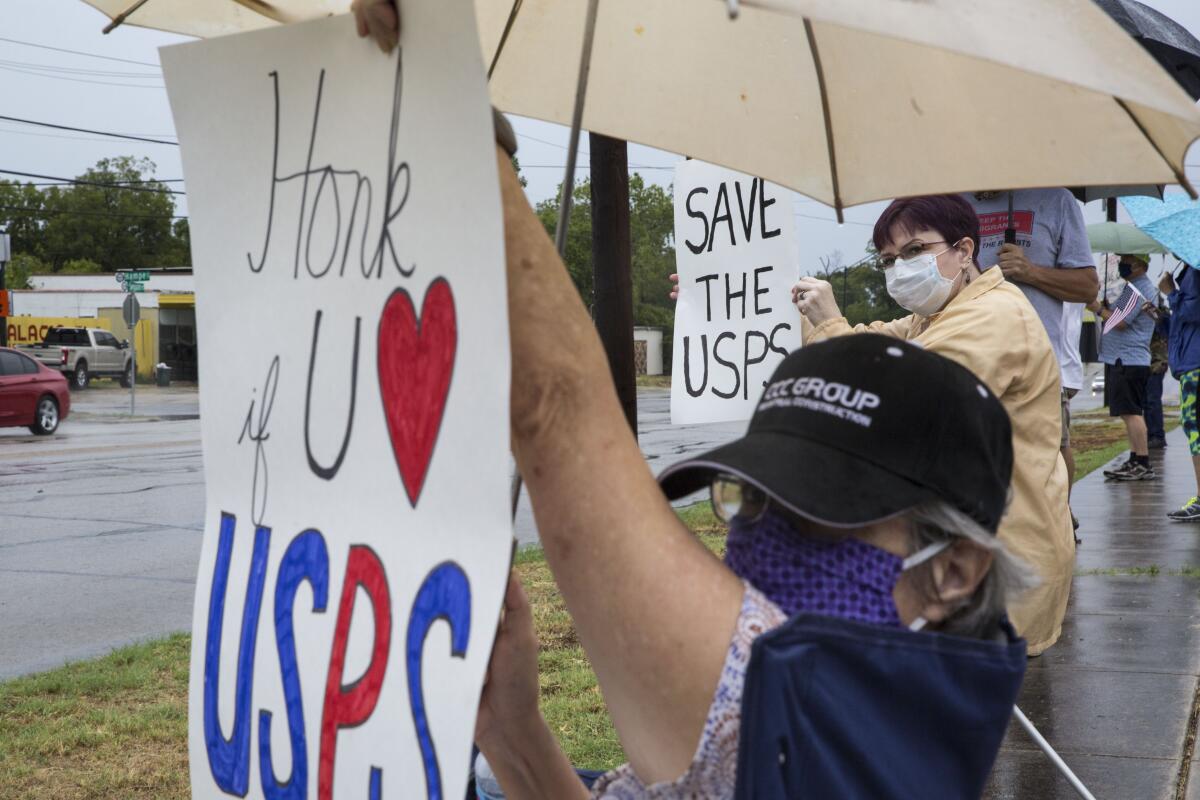Postal chief returns to Congress facing uproar over service delays

- Share via
WASHINGTON — Facing a backlash over operational changes that have resulted in mail delays, the nation’s new postmaster general is returning to Congress to testify before a House panel that has sharply criticized him.
The hearing Monday comes after the House approved legislation Saturday to reverse the changes in U.S. Postal Services operations and send $25 billion to shore up the agency ahead of the November election, when a surge in mail-in ballots is expected.
Louis DeJoy testified Friday in the Senate that his “No. 1 priority” is to ensure election mail arrives on time.
Still, the postmaster general, a political ally of President Trump, said he would not restore the cuts to mailboxes and sorting equipment that have already been made. He could not provide senators with a plan for handling the ballot crush for the election.
Rep. Carolyn B. Maloney (D-N.Y.), the chair of the Oversight Committee and author of the House bill, said DeJoy was using the Postal Service’s longstanding fiscal problems as an excuse “to justify sweeping and damaging changes to Postal Service operations. And we have all seen the results: national headlines about delays of days and weeks, veterans desperately waiting for their medications, sorting machines being ripped out and thrown in dumpsters.”
Maloney’s committee on Saturday released internal Postal Service documents warning about steep declines and delays in a range of mail services since early July, shortly after DeJoy took the helm. Delays have occurred in first-class and marketing mail, periodicals and Priority Mail, the agency says in an Aug. 12 briefing prepared by Postal Service staff for DeJoy.
“These new documents show that the delays we have all heard about are actually far worse than previously reported — and they are across the board,” Maloney said.
DeJoy acknowledged at the Senate hearing there has been a “dip” in service, but disputed reports of widespread problems.
In a statement Sunday, the Postal Service said it greatly appreciates House efforts to assist the agency, but remains concerned that some of the bill’s requirements, “while well meaning, will constrain the ability of the Postal Service to make operational changes that will improve efficiency, reduce costs and ultimately improve service to the American people.’’
House Speaker Nancy Pelosi (D-San Francisco) recalled lawmakers to Washington for a rare Saturday session over objections from Republicans, who dismissed it as a stunt. Trump urged a “no” vote, railing on Twitter against mail-in ballots expected to surge in the COVID-19 crisis. He has said he wants to block extra funds to the Postal Service.
White House Chief of Staff Mark Meadows dismissed the bill as “going nowhere,” while Pelosi urged the GOP-controlled Senate to act quickly. “The public is demanding action on this now,” Pelosi said Sunday. “I can’t see how the Senate can avoid it unless they do so to their peril.”
Meadows called the House bill a “political statement,” stressing that Trump would consider additional money only as part of a broader coronavirus relief package.
“That bill was not a serious bill,” Meadows said. “And my conversations with a lot of the Democrats on Capitol Hill ... is, if you want to be serious about it, this president is willing to put forth money and reforms.”
House Minority Leader Kevin McCarthy (R-Bakersfield) complained that the Democrats’ legislation would not make the Postal Service fiscally sustainable, nor would it make other reforms to the agency’s bylaws, such as removing a costly requirement that the Postal Service prepay decades of retirees’ health benefits. “Their plan isn’t about ballots, it’s about bailouts,″ McCarthy said of Democrats.
Senate Majority Leader Mitch McConnell (R-Ky.) has been eyeing a $10-billion postal rescue as part of the next COVID-19 relief package. “Senate Republicans are committed to making sure the Postal Service remains well equipped to fulfill its important duties. But the president has already made it clear he will not sign the speaker’s partisan stunt into law,” McConnell said after passage of the House bill.
“The Senate will absolutely not pass stand-alone legislation for the Postal Service while American families continue to go without more relief” from the coronavirus crisis, McConnell said.
Pelosi called White House proposals to deal with the pandemic “bare leaves,” saying they don’t address children facing food insecurity, people grappling with evictions, coronavirus testing and treatment or money for state and local governments.
Still, there were signs of bipartisan support for the Postal Service, one of the most popular government agencies with an approval rating above 90%.
Twenty-six House Republicans broke with Trump and GOP leaders to back the House bill, which passed 257-150.
A bill co-sponsored by Sens. Susan Collins (R-Maine) and Dianne Feinstein (D-Calif.) would provide the Postal Service with up to $25 billion to cover revenue losses or operational expenses resulting from COVID-19. The bill has at least 22 co-sponsors, including no fewer than nine Republicans. Three of the co-sponsors — Collins, Montana’s Steve Daines and Colorado’s Cory Gardner — are among the GOP’s most vulnerable incumbents in the fall election.
Senate Democratic leader Charles E. Schumer of New York said Sunday he had secured agreement with a new election committee created by the Postal Service’s Board of Governors to issue a report in two weeks on the service’s plans to address an expected surge of mail-in ballots. Under the agreement with the committee’s Democratic chairman, Lee Moak, the committee would also provide weekly briefings for top Senate Democrats.
The six-member Board of Governors, all of whom are Trump appointees, announced the bipartisan committee Friday to oversee mail voting. “Congress will use that report to ensure that the Postal Service has every resource it needs to protect and deliver election mail and hold DeJoy and the board accountable,” Schumer said.
More to Read
Get the L.A. Times Politics newsletter
Deeply reported insights into legislation, politics and policy from Sacramento, Washington and beyond. In your inbox three times per week.
You may occasionally receive promotional content from the Los Angeles Times.










